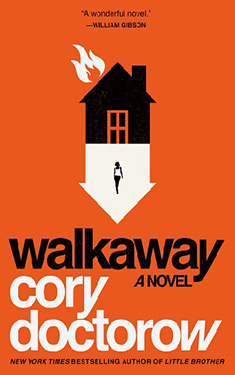Completed 10/10/2018,
Reviewed 10/10/2018
2 stars
The only Doctorow
I read before this book was Little Brother.
It was a fast paced, easy read that drew me in quickly. Granted, it was considered YA, but I really
enjoyed it. This book, his first “adult
novel” in eight years, was a slog to get through. With not much plot, it was a jargon-filled,
idea-driven novel that regularly lost me throughout the book. At times, it was like reading non-fiction in
dialogue form. Sprinkled in were heavy
battle scenes with acronyms and futuristic tech. By reading other reviews, I found out that a
lot of the jargon and acronyms came from video games. Even having finished the book, I still don’t
know what pnwing means. And he used it a
lot. I guess I wasn’t Doctorow’s target
audience.
 The plot is
basically simple. Three people decide to
“walkaway”, that it, basically drop out of society. This is easy to do because in the near
future, everything can be had with 3D printers:
food, clothing, shelter, medication, etc. They go to live in communes with other
walkaways. These people aren’t
completely off the grid, they still have some electricity, some form of
computers and are on the net. In their
communes, they have found a way to upload human consciousness onto the net. It’s not perfect, but it’s getting there. The whole walkaway paradigm and specifically,
the upload ability freaks out mainstream society, called the default, because
basically, they can live without consumerism and capitalism, and not fear death. The corporations and governments led by
zottas, the uber-rich, declare war on the walkaways, causing them to regularly
scatter and regroup.
The plot is
basically simple. Three people decide to
“walkaway”, that it, basically drop out of society. This is easy to do because in the near
future, everything can be had with 3D printers:
food, clothing, shelter, medication, etc. They go to live in communes with other
walkaways. These people aren’t
completely off the grid, they still have some electricity, some form of
computers and are on the net. In their
communes, they have found a way to upload human consciousness onto the net. It’s not perfect, but it’s getting there. The whole walkaway paradigm and specifically,
the upload ability freaks out mainstream society, called the default, because
basically, they can live without consumerism and capitalism, and not fear death. The corporations and governments led by
zottas, the uber-rich, declare war on the walkaways, causing them to regularly
scatter and regroup.
The idea of the walkaway is noble and of
course has profound effects on society, especially in a near future which
basically has no jobs and no hope for the non-rich. It’s pretty much an extrapolation of the
where society has been going, taken up a few notches, though not much. When one of the walkaways is an heiress to a
powerful zotta, the tension escalates as he tries to get back his
daughter. Of course, she has found the
joys of being a walkaway and doesn’t want to be found. He goes after her by force, attacking their
settlements, killing and scattering her friends.
I guess
because I’m not a video game player, I had no hope of understanding all the
jargon Doctorow used. I’m just not
plugged in enough. It made what could
easily have been a fast-paced novel a slow slog. For only 384 pages, I spent hours and hours trying
to get through it.
The other
big downfall to the book was the sermonizing of the characters. They had lengthy discourse on the evils of
the zottas and society and the benefits of walking away. I was very repetitive. Yeah, I get that they’re angry, but after a
while, I found myself skimming through it because it became boring. Nothing new was being said.
I actually
liked most of the characters. Most of
them were relatable. They all had chosen
names, like Etcetera and Iceweasel, which sounded stupid in the beginning, but
grew to be endearing after a while. They
ran the gamut of races, nationalities, and sexualities, which was applaudable. Their only problem was that they were too verbose.
I give this
book two stars out of five because I did not enjoy it. I trudged through it, mainly because I have a
hard time not finishing a book. In reflecting
on the book, I think it probably deserves a higher rating for the ideas
presented. I think Doctorow has a faith
in people that is profound. I just got too
bogged down by all the language I didn’t understand.
No comments:
Post a Comment